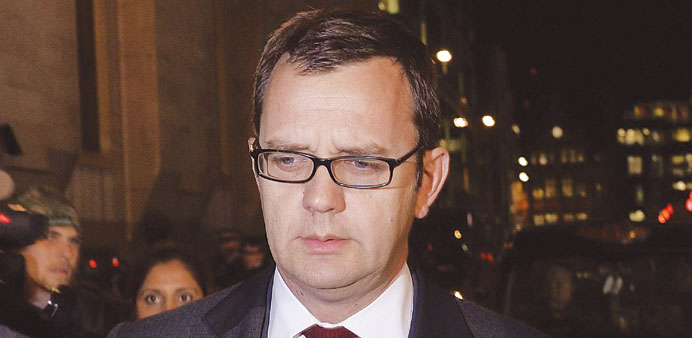|
Andy Coulson, then editor of Rupert Murdoch’s News of the World, instructed a journalist working on a story about a celebrity to “do his phone”, a jury trying Coulson and others for phone-hacking was told yesterday. |
The trial also heard that Murdoch’s British newspaper arm, News International, appeared to have given incomplete information to lawyers carrying out an internal inquiry in 2007 which gave the now-defunct paper a “clean bill of health”.
Coulson and fellow ex-editor Rebekah Brooks are the two most high-profile figures among eight defendants in the dock on various charges related to phone-hacking, illegal payments to officials for stories, and hindering police investigations. They all deny the charges.
After leaving the News of the World, Coulson went on to be Prime Minister David Cameron’s media chief, while Brooks, a close confidante of Murdoch and a friend of Cameron, rose to be chief executive of News International.
The Old Bailey heard that in May 2006, the paper was planning to run an exclusive story about the private life of Calum Best, the son of former Manchester United soccer star George Best.
During an e-mail exchange with Ian Edmondson, a former senior journalist who is also on trial, Coulson discussed whether Best might leak the story to others.
“Do his phone,” Coulson wrote in an e-mail shown to the jury. Prosecutor Andrew Edis told the jurors they would have to weigh up what he meant.
Earlier, the court heard that News of the World phone-hacking targets included England soccer star Wayne Rooney, actors Jude Law and Sienna Miller, and Tom Parker Bowles, the son of Prince Charles’s second wife Camilla.
Other victims included David Blunkett and Tessa Jowell, both ministers in the then Labour government, and Milly Dowler, a schoolgirl who went missing in 2002 and was later found murdered.
The disclosure that Dowler’s phone had been hacked while she was still missing caused widespread public disgust in the summer of 2011, prompting Murdoch to close down the 168-year-old paper.
Phone-hacking first hit the headlines in 2007 when the paper’s former royal editor Clive Goodman was convicted of tapping the phones of royal aides. Goodman is now on trial accused with Coulson of making illegal payments to police. The court heard Goodman had e-mailed Coulson in January 2003 asking him to approve a £1,000 cash payment to a royal protection officer for a “Green Book” which contained private numbers of the royal household and was later used to hack some of their phones.
“These people will not be paid in anything other than cash because if they’re discovered selling stuff to us they end up on criminal charges, as could we,” the e-mail shown to the jury said. Coulson replied: “This is fine.”
One of the stories which emerged from phone-hacking carried out for Goodman by private investigator and convicted hacker Glenn Mulcaire was the allegation Prince Harry had been helped by an aide with an exam while at the Sandhurst military academy. Goodman justified to bosses his use of cash payments to royal protection officers by saying they had helped with stories about Princes William and Harry and about Kate Middleton, William’s then girlfriend who is now his wife.
“I’m not going to put it in writing but any paper or computer trail that leads to them or their families will put them, me, you and the editor in jail,” he wrote in an e-mail. Goodman was sacked from the paper after his conviction and he launched a complaint of unfair dismissal which led to News International hiring the Harbottle & Lewis law firm to carry out an internal inquiry to see how far the criminality went. “It seems Harbottle & Lewis did not seem to have the whole truth for whatever reason,” prosecutor Edis told the jury.
“Harbottle & Lewis gave a letter to News International which effectively gave them a clean bill of health. You might wonder why they did that,” Edis told the jury.

